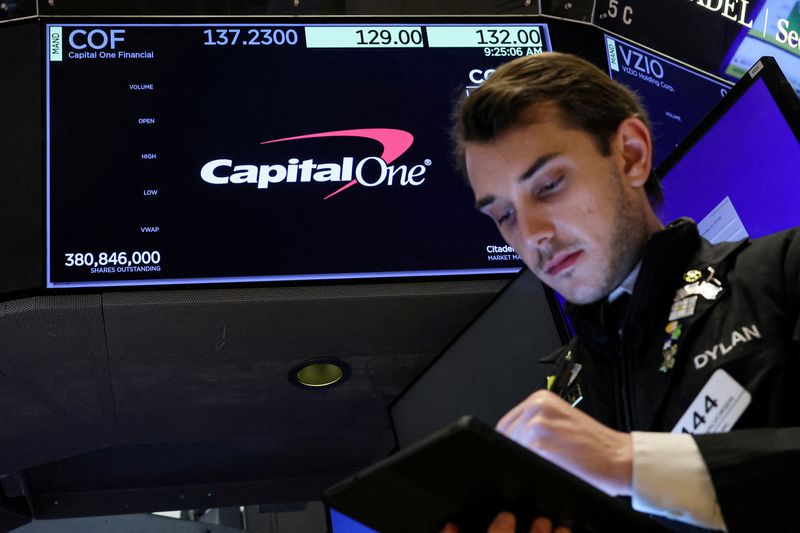By Michelle Price and Pete Schroeder
WASHINGTON (Reuters) -Capital One CEO Richard Fairbank and other executives went head-to-head with critics of its Discover Financial Services (NYSE:DFS) deal at a public meeting Friday, in what some analysts said was a strong showing by the credit card lender.
Unveiled in February, the $35 billion deal would create the biggest U.S. credit card issuer by balances, the sixth-largest bank by assets, and would give Capital One control of Discover's card payment network, the fourth major payment network operator.
Virginia-based Capital One and other proponents say the deal could boost card payments competition but opponents fear it would reduce services, increase costs for Americans and threaten financial stability by creating another too-big-to-fail bank.
“This acquisition advances financial stability and increases competition in the industry, while also providing significant new benefits in the communities in which we operate," said Fairbank in opening remarks at the all-day hearing.
The Federal Reserve and Office of the Comptroller of the Currency (OCC), which are under political pressure to be tough on mergers, are holding Friday's meeting in a rare move reserved for the most contentious merger reviews. It offers opponents an opportunity to ramp up public pressure on the regulators.
Among them, top congressional Democrat Maxine Waters (NYSE:WAT) urged regulators to block the deal, arguing it would "leave consumers with fewer national options."
Jesse Van Tol, CEO of the National Community Reinvestment Coalition (NCRC), a powerful coalition of nonprofits, also cited worries the deal would ultimately hurt consumers, and create financial stability issues.
"This merger is a terrible, horrible, no good, very bad idea," he said.
But analysts said it was unclear if their criticism would move the needle for regulators, who are required to review the deal on relatively narrow grounds, including its impact on financial stability, affected communities and competition. The Justice Department also weighs in on antitrust implications.
That process could take several more months, regulatory experts said.
"Capital One did a strong job framing the debate and that much of the criticism was what we expected," TD Cowen analyst Jaret Seiberg wrote. "Nothing we heard today changes our view that the bank regulators lack a statutory reason to block the deal."
Capital One on Wednesday committed $265 billion over five years to lending, philanthropy and investment if the takeover goes through, as it tries to appease critics and win over regulators.
That community benefits plan is more than twice as big as any to date, according to data from the NCRC which negotiated all previous plans, although Van Tol said it mostly comprised credit card and auto lending that the banks already provide.
He also said $44 billion promised for community development financing does not boost what Capital One and Discover had already been spending on a five-year average basis, according to NCRC's analysis of data the banks' disclosed in their merger application.
Capital One disputed the analysis in an email to Reuters, arguing NCRC's historical baseline includes anomalous market conditions in 2020-2021 affected by the COVID-19 pandemic, including historically low interest rates.
Capital One has said credit card and auto loans are key products for consumers that meet essential needs.

Beyond Capital One executives, Virginia state lawmakers and other advocacy groups spoke in favor of the deal, including Evan Leapheart, founder of financial literacy platform Kredit Academy, who said Capital one shares a commitment to poor communities.
Jeremy Kress, a University of Michigan professor and former Fed attorney, said he believed it was unlikely Friday's arguments on either side would significantly influence officials’ thinking, noting the hearing was mostly "good optics" for the agencies.